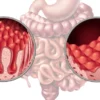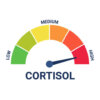
Gut bacteria play a role in many aspects of human health. This includes digestive and gut health (for example in IBS) but also in areas outside of the gut. This covers areas such as mental health, cardiovascular health and immune health.
A balanced gut microbiome (the name for the microorganisms in the gut) can promote and support human health. However, when the gut microbiome is out of balance or dysregulated health may be impacted.
While certain bacteria in the gut are understood to promote health, others are understood to be detrimental to health. With medical and scientific research into the gut microbiome and the gut bacteria increasing over recent years, working to understand how to support a healthy balance of the gut microbiome is a central topic, not only for gut and digestive health but overall human health, well-being and longevity. [Source: PubMed]
With gut health, the balance of the microbiome ecosystem is important. Supporting this microbial environment involves many aspects of health and support. Part of an approach to address microbial issues or imbalances can be to lower the less beneficial organisms in the gut. This may involve approaching the gut microbiome using tools to lower or kill bacteria, however, this needs to be seen as an element or consideration in the bigger picture of the approach.
This bigger approach to addressing imbalances or overgrowths of bad bacteria can be seen as an imbalance in the microbial ecosystem. This can involve underlying factors that have at some point or continue to contribute to the imbalances in the gut bacteria. Therefore, simply working to starve or lower bacteria does not take this holistic view into consideration. [Source: PubMed]
Bad Bacteria in Gut Symptoms
Alterations in the balance of the gut microbiome have been found in a wide range of health issues and symptoms. These imbalances can be referred to as dysbiosis which describes an alteration in the balance of the gut organisms that impacts the functions of the gut microbiome.
The symptoms and health issues that are associated with dysbiosis include digestive issues as well as non-digestive issues.
From a digestive perspective, these issues include:
- IBS [Source: PubMed]
- SIBO [Source: PubMed]
- Inflammatory bowel disease [Source: PubMed]
- Heartburn and GERD [Source: PubMed]
- Diverticulitis [Source: PubMed]
There are also non-digestive conditions that are associated with dysbiosis. These include:
- Autoimmune conditions [Source: PubMed]
- Type 2 diabetes [Source: PubMed]
- Obesity [Source: PubMed]
- Migraines [Source: PubMed]
- Eczema [Source: PubMed]
Therefore, working to support the balance of the gut bacteria, including lowering the levels of bad bacteria, can play a central role in a wide range of digestive and non-digestive conditions.
How to get rid of bad bacteria in the gut?
The balance of the gut microbiome is influenced by many factors. However, it is not possible to flush bad bacteria out from the gut.
The way the gut can be pictured is as a flower bed that needs to be looked after. A central part of any gardening process is to ensure the soil is healthy. This being the case, healthy plants will start to grow.
Often focusing on reducing bad bacteria can be short-sighted. This is due to some of the tools used to reduce bad bacteria also lowering the beneficial gut organisms. In the longer- term, this has the potential to lead to a depleted and more imbalanced gut microbiome.
Many of the factors that can influence the balance of the gut microbiome include:
- Mode of delivery (e.g., c-section or natural birth)
- Diet
- Age
- Sex
- BMI (body mass index)
- Antibiotic use
- Stress
- Sleep
- Infections
While some of these factors can be influenced, others can’t be altered. For example, it’s not possible to alter the mode of delivery. However, if the modifiable areas are supported this can influence the balance of the gut microbiome and support a healthy gut ecosystem. [Source: PubMed]
What Naturally Kills Bad Bacteria in the Gut?
Probiotic supplements work to help balance the gut microbiome which can help with gut issues such as IBS. Probiotics are commonly thought to add more bacteria to the gut to replace what is lacking, however, this is not the case. Instead, probiotics stimulate certain processes or responses from the body to help restore gut function.
One example of this is the way in which probiotics stimulate the body’s production of antimicrobial compounds. This is where the introduction of probiotics leads to a response within the gut lining that produces compounds that have the ability to target less beneficial (or bad) bacteria within the gut.
This can be understood to help stimulate the body’s own defence processes to restore balance to the gut microbiome. Considering appropriate strains of probiotic bacteria for specific symptoms or imbalances is an important aspect of the selection process. [Source: PubMed]
For example, the strain L. acidophilus NCFM has been found to have several benefits that include:
- antimicrobial activities
- anticarcinogenic activities
- ability to reduce cholesterol
- improve lactose intolerance
- address small bowel bacterial overgrowth (SIBO)
- address of gastrointestinal infections
- infections urogenital infections
- support of the immune system [Source: PubMed]
Antibiotics have been used to address gut imbalances such as SIBO as well as parasitic infections such as giardia. Antibiotics have also been found to influence the balance of the gut microbiome, leading to a dysregulated microbial ecosystem in the gut. This imbalance in the gut microbiome is referred to as dysbiosis.
This microbial imbalance is understood to impair the function of the gut microbiome. This can increase the risk of developing the symptoms of IBS or a gut infection. Dysbiosis as well as other health issues such as an impact on the immune system as well as metabolic dysregulation [Source: PubMed]
It has also been found that specific strains of probiotic bacteria can reduce potential side effects of antibiotics. Specifically, these are strains of Lactobacillus and Saccharomyces boulardii [Source: PubMed, PubMed]
What Foods Starve Bad Gut Bacteria?
A common diet that is followed when addressing symptoms of IBS or SIBO is a low FODMAP diet. This is a diet that reduces specific types of carbohydrates that can be poorly processed in the gut of those with these conditions and then lead to symptoms such as bloating or diarrhoea.
A misconception is that this diet is helpful because it starves bad bacteria. However, this is not the case. While there is research indicating that it can lower levels of histamine and inflammation in the gut, this diet is primarily used as a symptom management strategy and does not address the underlying issue in the gut. [Source: PubMed, PubMed]
A low FODMAP diet can, however, reduce the abundance of the beneficial microbes within the gut microbiome. This can be the case where the reduction of these fermentable fibres may reduce symptoms, but it can have a negative long-term impact on the gut if followed for a prolonged period of time.
Specifically, a reduction in the levels of beneficial and anti-inflammatory bacteria such as Bifidobacteria is noted on a Low FODMAP diet. [Source: PubMed]
More than starving these bacteria, eating to improve the overall gut ecosystem will create an environment that will promote a healthy balance of the gut microorganisms. [Source: PubMed]
The Best Diet for Gut Bacteria
The Mediterranean diet can be seen as a gut health-promoting diet. Whereas a Western diet can lead to alterations in the gut microbiome, referred to as dysbiosis, the Mediterranean diet can support a healthy balance of the gut microbiome and reduce the risk of a wide range of conditions such as obesity, diabetes, IBS and inflammatory bowel conditions.
The benefits of a Mediterranean diet are attributed to certain components of plant foods. These are the fibres as well as the antioxidants and polyphenols.
One of the key aspects and benefits of a high-fibre diet is the production of short-chain fatty acids. These are by-products of the fermentation process and a key energy source for the cells that line the gut. These have a wide range of benefits such as being anti-inflammatory, anti-microbial as well as antioxidant. The combination of these factors supports a healthy balance of the gut microbiome and reduces bad bacteria. [Source: PubMed]
The aspects of this diet are:
- High levels of minimally processed plant foods (e.g. fruits, vegetables, salads)
- High levels of mono and poly-unsaturated fatty acids (e.g. olive oil, fish)
- High intake of fibre (complex, insoluble and microbiota accessible carbohydrates)
- High intake of phytochemicals and vitamins
- Low levels of processed foods (eg red meat)
- Low levels of saturated fats
- Moderate calorie intake
These aspects of the diet result in specific changes to the gut and the gut microbiome that include:
- Improved microbiome diversity
- Increased levels of beneficial bacteria (e.g. Bacteroidetes, lactobacilli, Bifidobacteria, faecelibacterium)
- Reduced levels of less beneficial bacteria (e.g. firmicutes, proteobacteria)
- Improved gut balance
- Reduced levels of opportunistic bacteria
- Improved strength of the gut lining (reduced leaky gut) [Source: PubMed]
A key aspect of how this diet can support overall health and well-being and not solely gut health is due to the balance of the gut microbiome. This is due to the improved balance of the gut microbiome leading to lower levels of less beneficial bacteria that produce toxic products called endotoxins.
These endotoxins are understood to have a pro-inflammatory effect if they make their way from the gut into the bloodstream. This may then contribute to health issues. This dietary template improves the balance of the gut microbiome and the strength of the gut lining, this can be a key mechanism by which the risk of a wide range of health issues is reduced. [Source: PubMed]
How Long Does it Take to Starve Bad Gut Bacteria?
The gut microbiome is an environment that can shift and balance over a period of time. However, how long this takes can be down to the individual and the type of imbalance that’s present.
Studies using antimicrobial herbs to treat SIBO showed benefits in treating these gut conditions when these natural medicines were taken over a 4-week period. These herbs include natural compounds such as garlic and oregano. [Source: PubMed]
Other supplements such as the prebiotic powder PHGG have been shown to improve dysbiosis and reduce inflammation as well as improve symptoms such as constipation. This prebiotic feeds a specific group of beneficial gut bacteria that can then improve the gut ecosystem and reduce the bad bacteria. From a time-scale perspective, this is often taken over a period of 4-8 weeks. However, improvements in the gut microbiome may be noticed before this time. [Source: PubMed]
Many of the studies researching and examining the link between the Mediterranean diet and dysbiosis do so over a longer period of time such as several months. This indicates that long-term adherence to this diet is important to support the gut bacteria. [Source: PubMed]
Does Fasting Kill Gut Bacteria?
While food and diet are important to support the balance of the gut microbiome, periods of time away from foods have been indicated to support gut health and the balance of the microbiome. Periods of 5-day fasts have been shown to improve the balance of the gut microbiome. However, these periods of fasting are best carried out under medical supervision.
These periods of fasting have been indicated to increase the levels of key healthy bacteria such as Lactobacillus and Odoribacter. Additionally, periods of time of calorie restriction during Ramadan have also led to beneficial changes in the gut microbiome. Particularly in the increased levels of beneficial bacteria that produce beneficial short-chain fatty acids (eg butyric acid).
The increase in these beneficial organisms can improve the overall balance of the gut ecosystem and reduce bad or less beneficial bacteria. This is in part due to these organisms producing antimicrobial compounds that limit the presence of less beneficial bacteria in the gut microbiome. [Source: PubMed]
Probiotics That Kill Bad Gut Bacteria
Probiotic supplements can help to improve the balance of the gut microbiome. Their ability to kill bad gut bacteria can be considered indirect in their action.
The organisms in probiotic supplements are considered transient organisms. This means they travel through the gut and do not live in the gut forever. However, as they travel through, they interact with the gut lining and support a healthy response.
This response in the gut stimulates processes from the body that help to regulate and rebalance the gut microbiome and the gut ecosystem.
These can be probiotics such as:
- Lactobacillus
- Bifidobacterium
- Saccharomyces boulardii
- A. muciniphila
- Faecalibacterium prausnitzi
Many of these can improve the gut by stimulating the release of antimicrobial peptides from the gut lining. These are the body’s natural defence chemicals that can kill bad bacteria.
In addition, probiotics can improve the integrity of the gut lining (reducing intestinal permeability) and reduce inflammation. These 2 aspects are central to a balance ecosystem in the gut. When supported, the environment is healthier which is less hospitable to bad bacteria.
It’s important to note that research and studies indicate that specific strains of the bacteria have specific roles. This indicates that specific probiotics supplements can be more appropriate in certain situations or conditions. Therefore, supplements need to be selected with this knowledge. [Source: PubMed]
Herbs to Kill Bad Bacteria
Alongside supporting the growth of beneficial gut bacteria, herbal antimicrobials can be considered to further support the balance of the gut microbiome.
While certain herbs can be used to target specific gut microbes, many approaches use a combination of herbs to take several microbes or general imbalances into consideration.
However, long-term or inappropriate use of these herbal antimicrobials can negatively impact or deplete the gut microbiome.
These herbs include:
- Oregano
- Lemon balm
- Sage
- Red thyme
- Berberine
- Coptis [Source: PubMed]
Working with a registered gut practitioner can guide and support this personalised approach to gut health.






